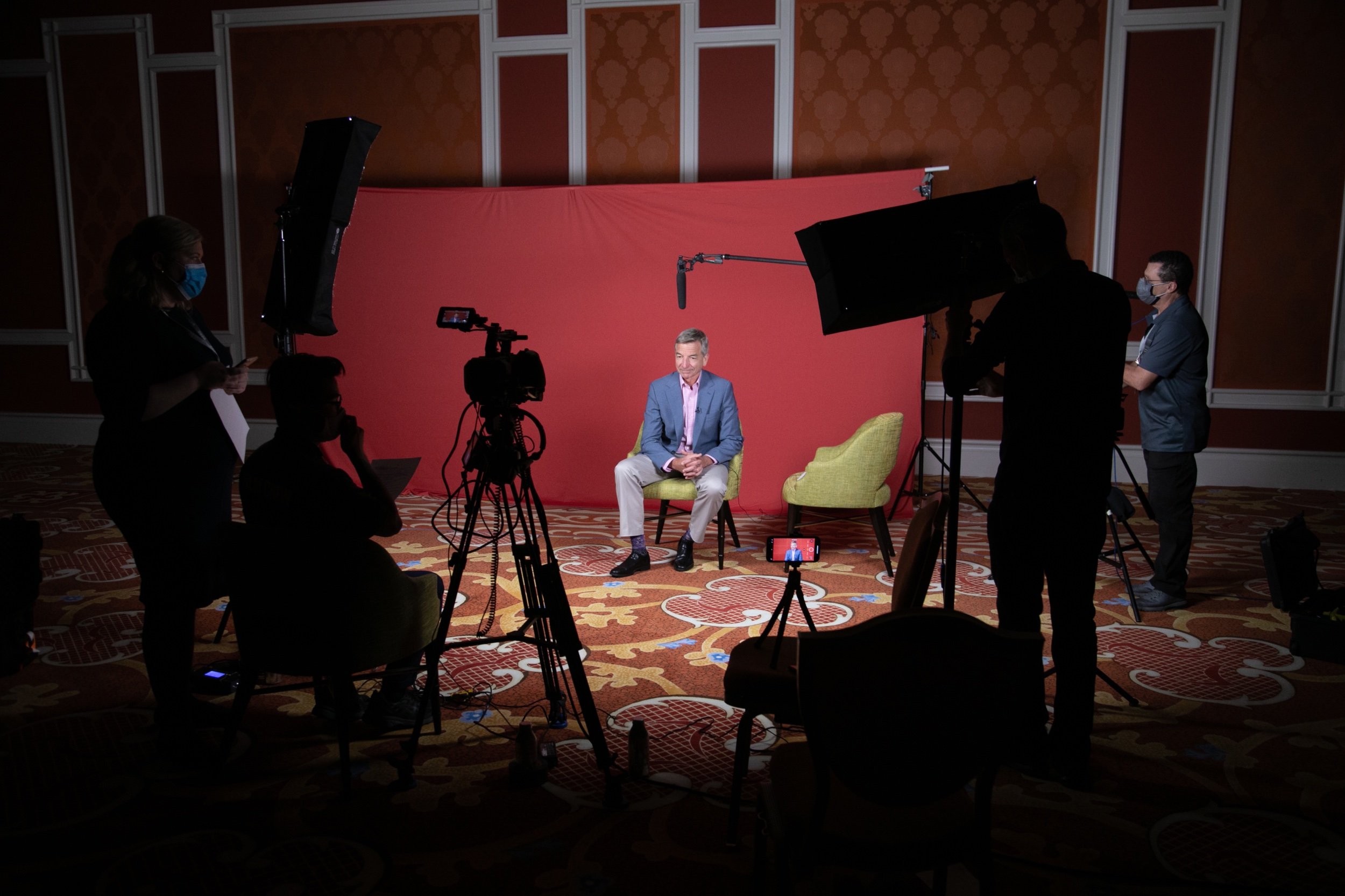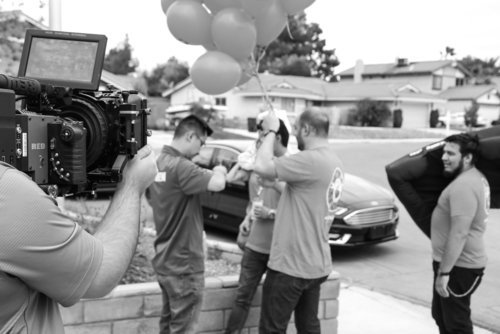How to Choose a Video Production Team for Your Conference
IFP Team
Want your conference to stand out and leave a lasting impression?
High-quality video production is key. It boosts engagement, extends your event's reach, and creates reusable content for future marketing.
Here’s what you need to know to choose the right team:
Define Your Goals: Decide if you need live streaming, highlight reels, speaker recordings, or audience testimonials.
Check Equipment: Look for teams using 4K cameras, professional audio gear, and proper lighting setups.
Evaluate Experience: Review portfolios for conference-specific work, ensuring they can handle multi-camera setups and live streaming.
Plan Ahead: Work with the team on scheduling, shot lists, and contingency plans.
Budget Wisely: Expect costs between $15,000–$25,000 for a 3-day event, with additional expenses for expedited editing or labor related.
Focus on Results: Track metrics like viewer engagement, social shares, and lead generation to measure success.
Quick Tip: Request references, read reviews, and ensure clear deliverables in your contract to avoid surprises.
Hiring the right team ensures your event isn’t just recorded but transformed into a dynamic, shareable experience.
Key Video Production Requirements for Conferences:
Before diving into selecting a production team, it’s crucial to outline the technical and strategic elements needed for effective conference coverage.
By understanding these core requirements, you’ll be better equipped to choose a team that can deliver polished, professional results.
Setting Clear Goals:
Start by defining the goals for your video production. These goals will shape how your conference is captured and presented.
Research indicates that organizations with well-planned video strategies experience 4–5 times greater engagement with their event content.
Here are some common production goals to consider:
Live streaming to connect with remote audiences in real time
Highlight reels for promoting future events or sharing key moments
Speaker presentations for on-demand digital distribution
Audience testimonials to capture authentic reactions and feedback
Behind-the-scenes content to share on social media
Equipment and Setup Needs
Producing high-quality conference videos requires professional-grade equipment to meet today’s standards. For instance, 4K resolution and clear audio capture are now considered the baseline for professional event coverage.
Make sure to address any unique requirements for your event, such as multi-camera setups for keynote speeches or dedicated filming stations for breakout sessions.
Event Planning and Scheduling
Pre-production planning should start months ahead of the conference to allow for thorough preparation.
Key scheduling steps include:
Allocating enough time for technical setup before the event begins
Strategically placing cameras to cover key presentations and activities
Coordinating with venue staff to optimize lighting and sound
Scheduling interviews with speakers and attendees
Preparing backup plans to address potential technical issues
Don’t forget to include breaks and networking time in your schedule to keep things running smoothly.
Provide your production team a detailed shot list that covers both planned activities and spontaneous moments. These unscripted highlights often capture the energy and essence of your event.
Finding Teams with Corporate Event Experience
When planning a corporate event, it's crucial to work with a team that has a solid track record in conference coverage.
Teams with this background understand the unique demands of such events, and their experience will shine through in their portfolio, client reviews, and technical expertise.
Past Work Examples
A team's portfolio is a great starting point to evaluate their ability to handle professional conference coverage.
For instance, if you're organizing a tech conference with multiple breakout sessions, look for examples in their portfolio where they've successfully managed simultaneous room coverage. This will give you confidence in their ability to handle similar challenges.
Conference-Specific Skills
Beyond their portfolio and references, the team you choose should demonstrate both technical expertise and effective event management.
Key skills to look for include:
Technical Capabilities: Multi-camera setups, robust live streaming options, professional audio capture, and backup equipment for redundancy.
Event Management: Quick setup and breakdown, minimal disruptions during sessions, smooth staff coordination, and flexibility to adapt to last-minute changes.
This blend of technical know-how and strong interpersonal skills can make all the difference in ensuring your event is covered seamlessly.
Team Evaluation Process
Once you've outlined your project needs, evaluate potential production teams using a scorecard that focuses on these key areas:
Technical Capability Assessment: Look at the team's technical expertise and the quality of their equipment. Confirm they have backup systems in place for critical components to avoid disruptions.
Portfolio Analysis: Examine their previous work, paying attention to:
The quality of videos and overall production standards
How effectively they capture speaker presentations
Audience engagement shots
Live streaming performance
Reference Checks: Speak with at least three references who can vouch for the team's ability to meet deadlines, solve challenges, communicate effectively, and deliver high-quality results.
Team Operations
Smooth event coverage relies on a team that operates in perfect sync. A skilled crew ensures consistent camera settings, maintains clear communication across operators, and prepares backup equipment while conducting thorough pre-event testing.
on set with IFP at VIVA 2024
Editing and Delivery
The work doesn't end on-site - strong post-production processes are just as important for delivering a polished final product. A professional team should excel in:
Quick Turnaround Editing Using dedicated workstations and shared storage, editors can produce high-quality content efficiently.
Multi-Format Content Delivery Content should be optimized for both high-resolution archives and bite-sized social media highlights.
Rigorous Quality Checks Processes like color correction, audio mixing, and multi-camera synchronization ensure the final footage looks and sounds flawless.
Statistics show that viewers spend 88% more time on websites featuring video content. Dedicated audio engineers can further enhance the experience by managing sound design, voiceovers, music selection, and mixing.
These technical capabilities form a solid foundation for selecting a production team capable of meeting your event's needs.
Contract Requirements
When drafting the contract, ensure it includes the following essential elements:
Detailed scope of work covering pre-production, filming, and post-production
Payment schedule tied to specific milestones
Clear deliverable specifications, including formats
Revision policy outlining the number of included rounds
Copyright and usage rights
Terms for cancellations and rescheduling
Insurance requirements
Confidentiality clauses
Be specific about technical details, such as requiring 4K resolution for main stage recordings, high-quality audio standards, and preferred delivery formats. Additionally, include contingency plans to address potential technical issues.
Finalizing these contract details will help you secure a production partner you can trust.
Extra Costs to Consider
Beyond the standard pricing, there are often extra expenses that you'll need to account for:
Hard drive for footage: $100+
Parking for film crew.
Travel, Lodging & Per Diems (if crew travels)
To avoid unexpected charges, discuss your needs upfront and request detailed quotes from production companies.
Measuring Results
To ensure your investment pays off, track the success of your video by analyzing:
Viewer retention rates
Social media shares and engagement
Feedback from conference attendees
Views of post-event content
Lead generation from recorded sessions
Attendance at future events
Satisfaction of speakers and sponsors
Value gained from repurposing content
According to research, websites with video content see 88% higher viewer engagement. This highlights how investing in professional video production can deliver meaningful results when done right. By carefully managing costs and focusing on measurable outcomes, you can make the most of your video strategy.
Conclusion: Securing Quality Conference Video Coverage
Choosing the right video production team takes more than just a quick decision - it’s about evaluating their technical skills, experience, and ability to collaborate effectively. A professional team doesn’t just record your event; they bring it to life with dynamic visuals and compelling storytelling.
To simplify the selection process, focus on these key priorities:
Technical Excellence:
High-quality, professional-grade equipment capable of delivering crisp, high-resolution footage.
Proven expertise in both live streaming and seamless post-production work.
Reliable backup systems to handle unexpected technical challenges.
Project Management:
Clear and consistent communication throughout the project.
Well-structured production schedules to keep everything on track.
Thoughtful contingency plans to adapt to any surprises.
Sharing comprehensive event details with your chosen team ensures they can deliver their best work. As Zac Buttivant, Owner of Spacebound Productions, puts it:
"Find someone creative who brings excitement and passion to your project. That's the best way to ensure your video will turn out well, as well as enjoy the production process".
filming a commercial for Solid Gold Pets
FAQs:
What should I consider when budgeting for video production at my conference?
When planning your video production budget for a conference, the first step is to clearly identify the purpose of the video. Do you need live streaming, a highlight reel, or full event coverage? Pinning this down will help you distribute your funds wisely.
Break your budget into key phases: pre-production, filming, and post-production. Each stage requires specific resources, so make sure none are overlooked. Equipment costs, like cameras and lighting, should also be part of your calculations, along with any technical requirements specific to the venue.
Hiring skilled professionals - videographers, editors, and possibly a production team - is a must to deliver polished, high-quality results. And don’t forget to include a contingency fund for those unexpected expenses that always seem to pop up. With thoughtful planning, your video production can run smoothly and align perfectly with your conference objectives.
How can I make sure the video production team I hire is skilled in live streaming and multi-camera setups for my conference?
To make sure your video production team is up to the task of handling live streaming and multi-camera setups, prioritize their experience and technical know-how. Check out their portfolio to see if they’ve worked on similar events, especially conferences, and don’t hesitate to ask for references or case studies to verify their skills.
It’s also important that they use top-tier equipment, like multiple HD cameras and dependable video switchers, to guarantee smooth transitions and deliver high-quality coverage. Take the time to discuss their pre-event planning process, covering details like camera placement and live stream testing, to ensure they’re fully prepared to meet your event’s unique requirements.
Lastly, confirm they offer on-site technical support during the event and conduct comprehensive rehearsals to identify and resolve any potential issues in advance. Following these steps will help you achieve a seamless video production experience that aligns with your conference goals.
How can I evaluate a video production team’s experience and technical skills before hiring them for my conference?
When evaluating a video production team for your conference, start by diving into their portfolio. Look for previous projects that match the goals of your event. Pay close attention to the quality of visuals, storytelling, and overall production. Examples of corporate or conference-related videos can be especially helpful since they closely align with your needs.
It's also important to understand their production process. A reliable team should be able to walk you through their workflow, covering everything from planning and filming to editing and post-production. Ask for a timeline and a breakdown of their role at each stage to ensure they can handle your project smoothly.
Lastly, don’t skip checking client testimonials or reaching out to references. This will give you insight into their professionalism, dependability, and ability to deliver quality work. Taking these steps will help you find a team that’s well-suited to your conference’s specific needs.
If you have any questions or would like to learn more, please comment below or reach me at kennytjay@indiemarchfilm.media




